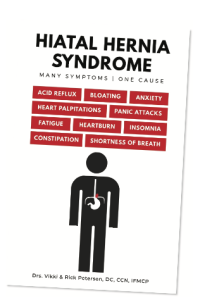Hiatal Hernia Treatment: A Drug-free Option? – Video
Hiatal Hernia Treatment: A Drug-Free Option?
What you will learn about
In this video about hiatal hernia treatment and finding root causes, Dr. Vikki addresses a question very often asked by patients: “Should I take antacids or anti-depressants?”
Perhaps unsurprisingly, the answer is no. But why?… Watch this short video.
Transcript of the video

It is close to an epidemic, I would say, in that there’s so many different facets of it. It’s so misdiagnosed, underdiagnosed. And of course, one of the common questions that is asked is, “what do I take?” You know, “what drug do I take?” Or even a natural solution? “What vitamin can I take?” And, and of course it’s normal, especially in our medical model, to look for “the one fix”, right? I’ve got this, what do I, what do I do for it as a single entity? And that’s not the answer.
So I want to go into why what we do is different and why just the drug is not gonna really do what you want it to do.
Let’s look at the two most common medications that people are offered for hiatal hernia treatment. The most common is antacids of various types. There’s a lot of different antacids. And of course this comes from the fact that one of the predominant symptoms associated with hiatal hernia is that the stomach is squeezing and inappropriately shooting the acid –that should be residing in the stomach– up the esophagus.
So you have heartburn (or acid reflux) and it can be pretty miserable, yhere’s no two ways about that. You can get a hoarse voice, it can mimic chest pain, it can mimic a heart attack and interrupt sleep. So this is something that will get your attention. And the conventional medicine model is “Oh, there’s acid in your esophagus; that’s inappropriate. Let’s put you on an antacid.”
On the face of it, that can make sense. However, it’s a terrible idea.
Hiatal hernia treatment: Why drugs don’t work
Why? Your stomach is really your first area in which digestion takes place. So you chew your food, then it goes down the tube called the esophagus and it gets into the stomach, which is literally a bag of acid. It’s designed to be that because it requires hydrochloric acid to break down the food. Now, as soon as you’re put on an antacid, you have squelched the ability of the stomach to do that first step of digestion. From the get-go, as soon as you’re doing that you have mal-digestion, mal-absorption,…
It’s an interesting sort of cascade that occurs in the digestive tract: when the broken-down food leaves the stomach in a normal digestive process, it’s of a size that’s being broken down by that acid. Then the enzymes in your small intestine and bile from your liver and gallbladder get to work. It’s all predicated upon step 1 occurring properly before step 2, before step 3. As soon as you’re on that antacid, step 1 doesn’t occur. There’s just really no way for proper to digestion to then occur, which sets you up for a whole cascade of problems of mal-absorption, mal-digestion, you’re not absorbing your nutrients. That is a problem.
There are also some dangerous side-effects associated with long-term antacids. I’m not going to go into that right now. Suffice to say, you’re not supposed to be on them for any length of time because of known dangerous side-effects. So there’s that.

The problem with those is, again, known dangerous side-effects like having suicidal tendencies, suicidal thoughts. These are not innocuous drugs by any stretch of the imagination.
So there are your two drug options, neither of which is going to correct the problem [hiatal hernia treatment] but, on the contrary, create more problems.
Hiatal hernia treatment: What do I take?
Back to the question “What do I take?“. When it comes to conventional medicine, there are no good options being offered to you. If you have a very severe hiatal hernia (we’re talking about a great deal of the stomach is above your diaphragm and you’re literally not digesting anything) then surgery can be the only option. And that’s where things like surgery are great: they do that thing that nothing else can do. But again, that’s pretty rare. In the case of minor or mild hiatal hernia, it’s rare that surgery is recommended because the success rate is poor. It tends not to last.
Think why. Why does somebody stitching that hole making it narrower, why doesn’t that last very long? It’s because you haven’t gotten to the root cause of why. That stomach is in spasm, it’s pushing up, slowly widening that hole again over time because you didn’t get to the root cause of why that stomach is in spasm, why the diaphragm is too high. There’s a whole combination of structural issues that need to be addressed.
What we do that’s so different… And I must tell you, it started with pulling down the stomach and sort of breaking up that spasm, and patients would say “Oh, that feels so much better“. But it was temporary and we hate temporary, we like “fix”. Hence the name of our clinic, Root Cause Medical Clinic. Insofar as hiatal hernia treatment is concerned, we don’t want a temporary fix. We want it truly fixed. And as we learned more and more, as we saw more and more patients, we realized that the reason the stomach is in spasm, it’s not just about breaking the spasm… you have to get to the why.
Now, the why is a few different things.
Hiatal hernia treatment: Going to the root
You can have certain foods that you’re eating that are causing the stomach to get irritated. And when it spasms, it has no direction to go but “up” because it’s attached by the esophagus.
Then you can have infections. There’s a variety of bacterial infections or parasitic infections in the stomach or in the gut. And unfortunately with our food system not being as healthy as it should be, we don’t have a good balance of “the good guys’: probiotics. We’ve got more bad than good, and it can create the gas and the bloating, just an imbalance of this population in the gut.

There’s many different things that have to be assessed, but when you get to the root of that, the problem is handled.
Now it’s hard to understand, as far as conventional medicine is concerned, some people may be used to their constipation; they’ve had it for a long time and they just feel this pressure and they say “wow, I really, I’m short of breath, you know, I feel a little anxious. My heart’s palpitating.” Why is all this heart and “lung issues” happening? Heart palpitations, trouble breathing… You go see a pulmonologist, a cardiologist and they all throw up their hands going “You’re fine. There’s nothing wrong with your lungs. There’s nothing wrong with your heart“. And you go “Well, that’s nice, but this is really happening to me.”
It is all secondary to that diaphragm (which is that sheet of muscle which allows air to come in and out effortlessly) is kind of spasmed. Because it’s not allowing enough air, you feel short of breath. Then there’s a nervous system connection. There are a lot of different systems that feed into this. Not everyone had these symptoms, but if it’s you, you know what I’m talking about. So you get this anxiousness or feeling of “I don’t know why, but I’m super anxious.” It’s because your nervous system is telling you to be anxious. It’s actually secreting stress hormones to get your attention to let you know “There’s not enough oxygen coming into the system, and I want you to do something about it“. So it gives you those stress hormones just to wake you up and say, “Do something!”
That’s a nice survival response, that’s your body’s trying to help you, but you’re feeling miserable and nobody’s giving you a good answer.
To come full circle on this, the most common question is “what do I take?”
It’s not a single thing actually. As I said, we have to tease out what the root cause factors are for you. Should you do surgery? I don’t recommend it unless it’s severe and there’s no other option, because the success rate is poor. It doesn’t tend to last because you didn’t get to the root cause.
When you have hiatal hernia symptoms, you have to realize there’s a lot of issues with digestion and absorption as I mentioned earlier. And that’s affecting all of you.
No part of your body can work correctly if it’s not being fed and nourished properly. And that’s what your digestive tract does. So you can see that there’s such a combination of issues happening here. The great news is (and that’s what we’ve been developing for decades) is the cause of why it’s that way for you. And the great news is, as I said, it’s natural. No drugs, no surgery. Yes, there are some lifestyle changes, but it’s worth it It’s worth it to feel great.
I hope that answers a very common question that we hear. If you want the drug-free route to hiatal hernia treatment, give us a call: we can consult you in person at our clinic in Clearwater, FL or we can also do a telemedicine consultation. We would be delighted to really get to the root cause of this for you because you suffering and not understanding why and not getting any help. You are not alone.
Why choose Root Cause Medical Clinic for your hiatal hernia treatment?

Root Cause Medical Clinic has become the leading specialist in the diagnostic and treatment of Hiatal Hernia Syndrome.
We have a very high success rate with our patients, as long as they are ready to make the dietary and lifestyle changes that help their body heal. If you have a hiatal hernia, chances it has been built over many years. These changes will be necessary to your treatment. They may sound daunting, but we will hold your hand through them, making each step an easier one.
Offices and telemedicine
Root Cause Medical Clinic offices are located at the corner of S. Ft Harrison and Magnolia St near downtown Clearwater, FL. We have ample parking space, you won’t have a problem parking your car. If you can’t come in person for a consultation, we offer telemedicine consultations in certain states. Please call us for details and to schedule a first consultation.
Additional resources:
Dr. Vikki’s new book on Hiatal Hernia Syndrome: Misdiagnosed, often ignored, yet extremely common among Americans of all ages
Dr. Vikki’s take on surgery for Hiatal Hernia


